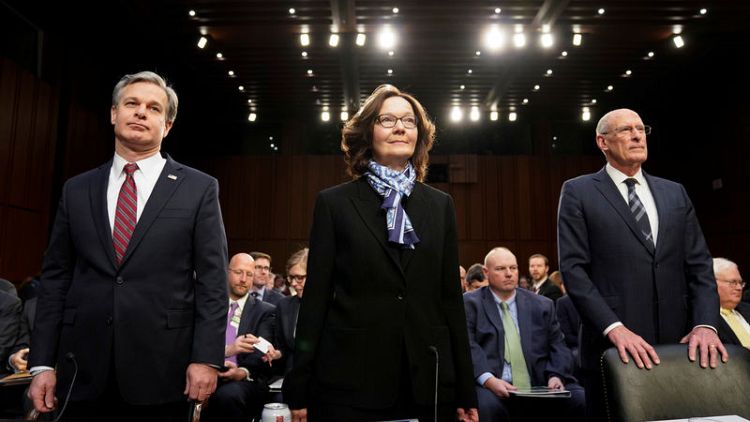By Patricia Zengerle and Doina Chiacu
WASHINGTON (Reuters) - Russia and China pose the biggest espionage and cyber attack threats to the United States and are more aligned than they have been in decades, the leader of the U.S. intelligence community told U.S. senators on Tuesday.
While the two countries seek to expand their global reach, Director of National Intelligence Dan Coats said, some American allies are pulling away from Washington in reaction to changing U.S. policies on security and trade.
"China, Russia, Iran, and North Korea increasingly use cyber operations to threaten both minds and machines in an expanding number of ways - to steal information, to influence our citizens, or to disrupt critical infrastructure," Coats said.
"Moscow's relationship with Beijing is closer than it's been in many decades," Coats told the Senate Intelligence Committee's annual hearing on worldwide threats, where he testified with the director of the CIA, FBI and other top intelligence officials.
He also said some U.S. allies are seeking more independence, responding to their perceptions of changing policies on security and trade and "are becoming more open" to new partnerships.
"The post-World War Two international system is coming under increasing strain amid continuing cyber and WMD proliferation threats, competition in space and regional conflicts," Coats said, using the acronym for weapons of mass destruction.
ELECTION SECURITY
Coats also said U.S. adversaries likely are already looking to interfere in the 2020 U.S. election, refining their capabilities and adding new tactics.
He said Russia's social media efforts will continue to focus on aggravating social and racial tensions, undermining trust in authorities and criticizing politicians perceived to be anti-Russia.
Senator Mark Warner, the panel's top Democrat, said in his opening statement that he was particularly concerned about Russia's use of social media "to amplify divisions in our society and to influence our democratic processes" and the threat from China in the technology arena.
The United States on Monday announced criminal charges against China's Huawei Technologies Co Ltd, escalating a fight with the world's biggest telecommunications equipment maker and coming days before trade talks between Washington and Beijing.
"Especially concerning have been the efforts of big Chinese tech companies – which are beholden to the CCP (Chinese Communist Party) – to acquire sensitive technology, replicate it, and undermine the market share of U.S. firms with the help of the Chinese state," Warner said.
The U.S. Justice Department on Monday charged Huawei and its chief financial officer, Meng Wanzhou, with conspiring to violate U.S. sanctions on Iran by doing business with Tehran through a subsidiary it tried to hide and that was reported on by Reuters in 2012 https://reut.rs/2sRL7Ve and 2013 https://reut.rs/2sUq8RT.
"China is going to be a major competitor of ours in every way that there is," said Republican Senator Jim Risch, an intelligence committee member who is also chairman of the Senate Foreign Relations Committee.
(Reporting by Patricia Zengerle and Doina Chiacu; editing by Jonathan Oatis)
